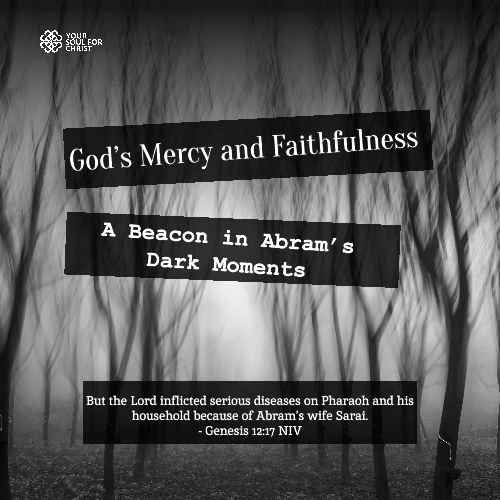But the Lord inflicted serious diseases on Pharaoh and his household because of Abram’s wife Sarai. So Pharaoh summoned Abram. “What have you done to me?” he said. “Why didn’t you tell me she was your wife? Why did you say, ‘She is my sister,’ so that I took her to be my wife? Now then, here is your wife. Take her and go!” Then Pharaoh gave orders about Abram to his men, and they sent him on his way, with his wife and everything he had.
Genesis 12:17-20 NIV
The story of Abram in Genesis 12:17-20 is a remarkable testament to God’s mercy and faithfulness. Despite Abram’s failures and mistakes, God remained committed to His promises. This passage illustrates how God’s mercy and faithfulness can prevail, even when human decisions falter. This story reminds us that God’s mercy and faithfulness are unwavering, providing hope for restoration and guidance in our lives.
Abram journeyed to Egypt without seeking God’s guidance. In an attempt to protect himself, he presented his wife Sarai as his sister. This deception not only endangered Sarai but also put others at risk of God’s judgment. Yet, God intervened, inflicting serious diseases on Pharaoh and his household to reveal the truth and rescue Sarai.
Abram’s actions caused unintended consequences:
Misrepresentation of Faith: Abram, meant to be a light to the nations, failed to reflect God’s righteousness in Egypt. He let fear dictate his actions instead of standing firm in faith, dimming the light he was called to shine.
Unbelievers’ Rebuke: Ironically, Pharaoh—whom Abram likely considered a godless ruler—confronted him with the truth. Pharaoh’s questions, “What have you done? Why didn’t you tell me she was your wife?” exposed Abram’s lack of integrity and the potential harm his deception could have caused.
God’s Faithfulness Despite Failure: Despite Abram’s missteps, God’s mercy prevailed. God protected Sarai and ensured His promise to Abram remained intact. This act of divine intervention underscores the truth that God’s faithfulness does not depend on human perfection.
While this story reveals God’s mercy, it also serves as a cautionary tale. God’s grace is not a license for careless living. As believers, we are to reflect God’s character in all we do. We must carefully consider the impact of our actions on our relationship with Him and our testimony to others.
Abram’s failure to trust God led to a situation where he was sent away. This reminds us that actions rooted in fear or self-interest can lead to spiritual and relational consequences.
Furthermore, this passage challenges me to examine my own actions and intentions. Am I shining as a light in the darkness, or am I concealing that light through fear, compromise, or selfishness? Like Abram, I must remember that my actions not only affect me but also those around me. I must be a faithful representative of God’s light and truth.
In conclusion, the story of Abram in Egypt is a profound reminder of God’s mercy and faithfulness, even when we fail. It calls us to live with integrity, trust in God’s plan, and avoid actions that could dim our light. Ultimately, this passage assures us that while our failures may have consequences, God’s grace is always greater, providing hope for restoration and renewal.
Let us strive to reflect His light and remain faithful, knowing that God’s mercy is not only a comfort but also a call to live in alignment with His purpose.
